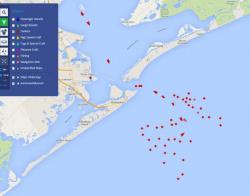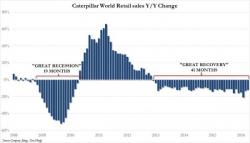Something Stunning Is Taking Place Off The Coast Of Singapore

"I've been coming to Singapore once a year for the last 15 years, and flying in I have never seen the waters so full of idle tankers,"
- Senior European oil trader a day after arriving in the city-state.
Back in November, when the world-record crude inventory glut was still in its early innings, we showed what we then thought was a disturbing image of dozens of oil tankers on anchor near the US oil hub of Galveston, TX, unwilling to unload their cargo at what the owners of the oil thought was too low prices.


